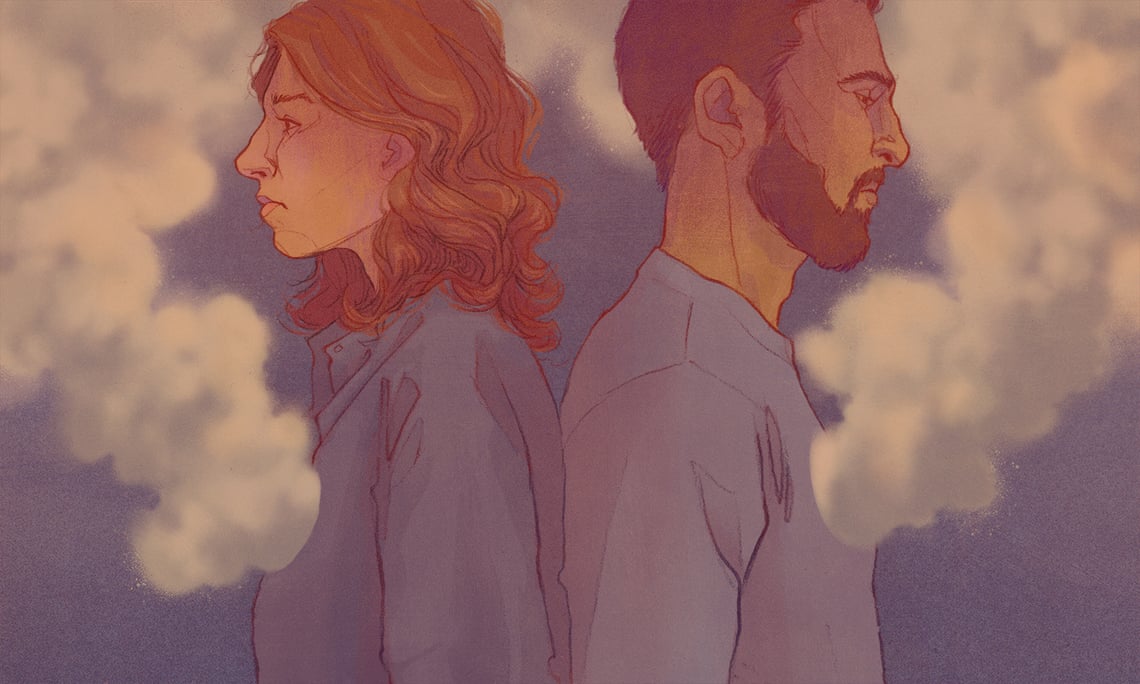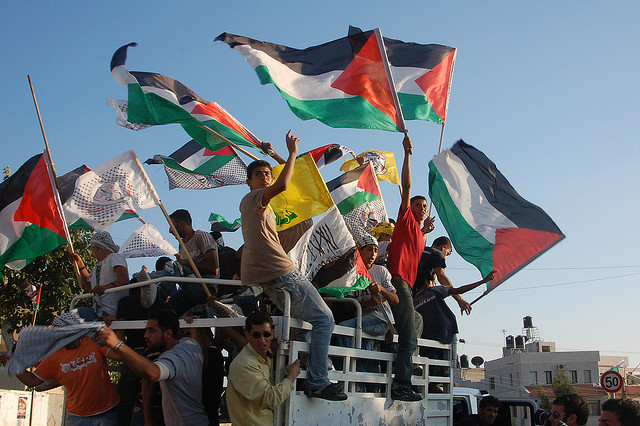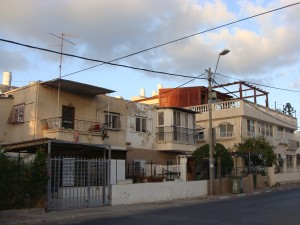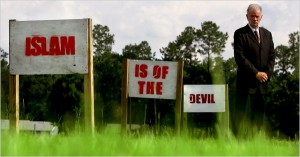At this moment, no one understands our pain better than one another. My ex-husband and I are both clinging to what’s most familiar: the two of us, our kids, our family.

It’s a Monday afternoon – just two weeks since 7 October – and I’m floating somewhere outside myself as I teach my weekly multimedia class at the university. I hear myself cracking jokes and responding to students’ questions. I feel myself smiling. But when I look down at my arms and hands as I pack up at the end of class, I don’t recognize my own body. There’s that familiar golden peachy tone, that skin that took Tel Aviv’s sun so many years ago, and carried it back with me to the US. And yet, I can’t quite place these particular arms and hands.
But the phone, the phone is familiar. After I wave my last student goodbye, I pull it from my purse and read the latest messages. My ex-boyfriend in Tel Aviv – an Israeli vegan, anti-Zionist pacifist – tells me he’s now looking for a stun gun for self-protection. Another friend, a photojournalist who lives in the north, not far from where Israel has been exchanging fire with Hezbollah, is searching for a bullet proof vest. He’s driving around with an axe in the back of his car, he adds, punctuating the sentence with the laugh-till-you-cry emoji. I send messages to my distant cousin in Pardes Hanna, a laidback town between Tel Aviv and Haifa, asking about her and her family, and to one of my closest friends, who lives in Eilat – a city that will soon be under rocket fire from Yemen. All over the country, my loved ones are terrified.
Tears start to fall down my cheeks, my eyes leaking uncontrollably again, as they have for weeks now.
Then I check the news and I see that the country I lived in for almost a decade, the place where I became the adult I am today, the state I’m a citizen of, is pummeling Palestinians in Gaza, and thousands of civilians are dying.
I am Israeli. My ex-husband and our two children are Palestinian.
The evening of 7 October was the last time I managed to go grocery shopping; since then, Mohamed – my Palestinian ex-husband – has been haphazardly picking up just enough food for us to keep feeding our two children, aged seven and six.
Not only did Mohammed take up grocery shopping without any discussion, but he is living with us again now, despite the fact that we’re divorced.
Since the fall of 2022, Mohamed and I have been trying to follow a custody arrangement sometimes referred to as “bird nesting”, in which the children stay in one place and the parents rotate in and out – keeping the children under one roof at all times but ensuring that the parents never are.
We have all but remarried
The small home I share with our children, our dog and our cat has served as the nest or home base; prior to 7 October, Mohamed lived, most of the time, with his brother, coming and staying with the kids when I was out of town for work or in the rare event that I was gone for leisure. Our parting was, for the most part, amicable, and there was the occasional family dinner and sleepover. But in the end, he always went back to his brother’s.
Since the war began, however, we have all but remarried. At this moment, no one understands our pain better than one another. In the midst of our shared grief, we both reach for and cling to the thing that is most familiar – the two of us, our kids, our family.
On 6 October, I was wrapping up a work trip to the Seattle area. Anxious to get home to my children and worried I’d somehow miss my flight, I woke in the middle of the night. When I picked up the phone to check the time, I saw a notification from my ex-boyfriend, who has remained one of my closest friends.
“In case you wondered,” he wrote in Hebrew, “I’m OK.”
Oh God.
I knew to check the news. I couldn’t believe what I saw.
After arriving at Seattle’s airport at 6am, I called Mohamed, who had just woken up.
“Did you see what happened back home?” I asked. “Yeah,” he said. “It’s gonna get bad.”
“Get bad?” I bristled. “It’s already horrible.” Terrifyingscenes flashed through my head: people hiding in their homes, sending frantic WhatsApp messages to loved ones – “I hear shooting” – and the heartbreaking goodbyes rendered over text – “I love you.”
But I knew what Mohamed meant: it was going to get bad for the Palestinians. I told him he was right because I, too, feared Israel’s response. The brutality of the Hamas attack, I knew, would give the Israeli government carte blanche, a sense of absolute immunity to do whatever the hell they wanted to Gaza. And, certainly, we’d see some sort of crackdown in the West Bank, as well as violent acts of revenge.
Whatever happened, I knew, it was going to be a disaster for both sides. A selfish thought ran through my head: we’re never going to go home again.
Mohamed’s family lives in Ramallah, which is where Mohamed and I first met. It was 2011, and I was visiting to report a story about the Palestinian Authority’s bid for an upgrade of its status at the UN. He was a journalist; my Arabic was weak and I needed a translator. A friend connected us, and we felt the sparks right away. I was living in Tel Aviv then, but by the time we started dating in 2013, I’d moved to Jerusalem and was teaching at a Palestinian university in the West Bank.
Despite the fact that my professional work and personal life was increasingly rooted among the Palestinians, our courtship was fraught. Mohamed’s father had been a member of the Palestine Liberation Organization. The Israelis had arrested, tortured and deported him from the West Bank to Jordan in the late 1970s; the family had only been able to return from their forced exile in 1997, several years after the Oslo Accords had been signed.
When Mohamed told his father that he intended to marry not just a Jewish woman but one who held Israeli citizenship, his father rejected the match. Unable to live in the family home together in the West Bank and unable to live together legally inside of Israel, we left in 2014 and came to Florida, where we married and had our two children.
The last time we were back as a family was in late 2016, when our daughter was nine months old. We were unable to enter together as a family. For the first time since she was born, my daughter spent a day away from me as she and Mohamed traveled through the only crossing Mohamed can use as a Palestinian, Allenby Bridge, which just so happens to be one of the only crossings I can’t use as an Israeli. We reunited in Ramallah, where Mohamed registered our daughter as a Palestinian.
Today, our situation, which was already complicated, seems impossibly so.
Wanting to bring a sense of normalcy to our home on this side of the ocean, I picked up some groceries on my way back from the airport: fixings for tacos, quesadillas and guacamole. That would be the last time I would manage to go to the store for over two weeks.
That night, Mohamed and I made dinner together as the kids watched a movie; we sat down as a family to eat. Afterwards, there was no talk about him leaving. In the morning, we agreed we wanted to give the kids a sense of calm and normalcy, so we decided to take them to the beach.
On the way there, Mohamed and I had a conversation in code, with me relying on what little Arabic I’ve retained in the nine years since we left the West Bank. I told him that what happened on 7 October wasn’t muqawamah, resistance. It’s a crime. And if it’s considered muqawamah well, then, I guess I don’t support resistance. Fine, don’t call me a leftist any more. I don’t care.
Yes, I’m an Israeli citizen but Palestine is part of them, part of us, part of me
In the front seat, I babble incoherently but quietly in my strange mix of English, Arabic and Hebrew – the latter of which Mohamed doesn’t fully understand – until our daughter asks from the back: “What’s going on?”
She’s seven. She’s smart. She’s just finished reading the entire Harry Potter series.
“There’s a war in Israel,” I say.
“Oh,” she says. “Who are they fighting?”
There’s a pause. I can’t be the one, I can’t say it, because I don’t want her to think I hate them, the “them” who are half of her – the them who, I feel, are also part of me. My children are Palestinian; I carried them in my womb. During pregnancy, something called cell migration takes place, the baby’s DNA crossing into the mother’s bloodstream and organs, where it “can persist for decades”, scientists say.
Yes, I’m an Israeli citizen but Palestine is part of them, part of us, part of me.
I don’t have the heart to tell Farah who the Israelis are fighting. Instead, I say nothing and I turn and look at Mohamed, waiting for him to answer.
“Ya baba,” he began, glancing in the rearview mirror. Baba means Dad in Arabic and parents address their children like this – Mohamed calls the kids “Baba” and mothers call their children “Mama”.
He hesitated.
“Mohamed,” I prodded.
He’d already told me he wanted to shelter them as much as possible from what is happening, but we can’t not tell them that there’s a war. Details, they don’t need. But the broad outline, they have to know.
Finally, he tells our daughter: “Ya baba, the Palestinians.”
I’m relieved she doesn’t ask another question.
But I do in the days that follow. I have so many questions and I ask Mohamed things I’m ashamed to admit now. I ask him if he supports Hamas’s “operation” on 7 October, the massacre. I ask him if he thinks this helps the Palestinian cause. I ask him if his family in the West Bank – the blood relations of my own children – handed out candy to celebrate the horrible, brutal deaths of Jewish people, my people.
These questions are racist and unfair and I’m disgusted by them, by myself for asking them. I admit as much and I apologize. Mohamed is compassionate. “You’re human,” he says. “You’re upset.”
And I’m upset as my Facebook feed fills with people sharing the pictures of the missing and dead from the nature party and the kibbutzim next to Gaza. I sit and read it all aloud to Mohamed, translating the Hebrew to English and imploring him: “Look at the pictures. Look at the people.”
He takes a seat on the couch next to me, pats my back – a gesture our son has learned from him – and holds my hand.
And I try to be there for Mohamed, too, in his grief, as he mourns the loss of Palestinian life. I put a hand on his shoulder as he sits, reading the news on his phone. I hug him when he has no words but his face tells me how sad he is.
Is it strange that in these days, the darkest we’ve experienced in the decade we’ve been together, we’re closer than ever?
For the foreseeable future, I can’t imagine this changing. There’s no small irony here: at a time when our people are battling the fiercest since 1948, we are completely united. We’re opposed to people dying. Period. It really is that simple.
Setting the lofty, political symbol of our union aside, with two kids, there’s day-to-day life to manage. The fridge has gotten a little too bare and it’s time for me to pick up some food. On Sunday, I sat down and did something I have never managed to do in all my years as a working mother: I made a meal plan for the entire week. It’s bizarrely sumptuous. Those who died on 7 October will never enjoy a meal like this again and now, in Gaza, people are dying in droves. Others are facing food and water shortages. Shame flickers inside of me. I’m ashamed of this grocery list and the meals I’m going to make.
Mohamed is keeping me – us – together despite the fact that we tried to part
Inside Whole Foods, my phone still in my hand, I do a lap in the produce section. And then another. I have a list but I can’t pay attention to the words. I put a red bell pepper in the wagon, a few avocados. My phone pings and I talk to my ex-boyfriend in Tel Aviv and then I look at the international journalist WhatsApp group that I’m on, that’s getting terrifying, with heartbreaking reports from Gaza. I look up, dazed, and remember I’m in a grocery store.
There was something Mohamed wanted me to get. What was it? I call him. “I’m at Whole Foods. What was it you wanted me to get?”
“Chicken,” he answers.
“Chicken, chicken, chicken,” I chant as I make another loop in the produce department.
A few minutes later, I can’t remember what it is, exactly, that Mohamed wants me to get.
So I call again.
Finally, I leave the store. I load the paper bags into the car and begin to drive away. I call Mohamed, who doesn’t even sigh when he answers, as he would have before 7 October.
“Aiwa, ya Mya?” he answers. “Yes?”
“What did I forget?” I ask him, as though he is there with me, as though he can read my mind.
“I don’t know. The chicken?”
“Fuck. The chicken.”
In a normal time, this would be funny. Or annoying. But today, it makes me cry. I am crying because I realize that I’m unraveling, and because our home over there is unraveling. I’m crying with gratitude that Mohamed is keeping me – us – together despite the fact that we tried to part.
“Who’s picking up the kids today?” I ask through tears. I know we have had this conversation half a dozen times today already.
“You are?” his voice, patient as ever.
“Yes, but who’s taking them to what?”
He reminds me of our plans and so I race to the children’s school, pick them up, drop our daughter at dance, drive our son to the nearby basketball court, where Mohamed meets us. I head to another grocery store, this time with the word chicken scrawled in ink on my disembodied hand.
I don’t know what the future holds for us as a couple. I know that we have two kids to take care of – two children who share both of our blood, and whose hopes and dreams and futures we are equally concerned about regardless of how the world defines them and regardless of how they might eventually define themselves.
Israeli. Palestinian. Both. Neither. At this point, it doesn’t really matter to us. We want them to be safe and happy, healthy and productive.
As for the two of us, we have tried to separate but can’t manage to part. The analogy isn’t lost on me. But the tragedy I circle around – one I’ve been obsessing about for years now – is that in order for us to exist together, in peace, we had no choice but to leave the land that we both love dearly, the place where we met, the land on which we fell in love.
That we can exist in peace together is a beautiful thing. But what does it mean that we can only exist in peace together outside the land we would like to share?


